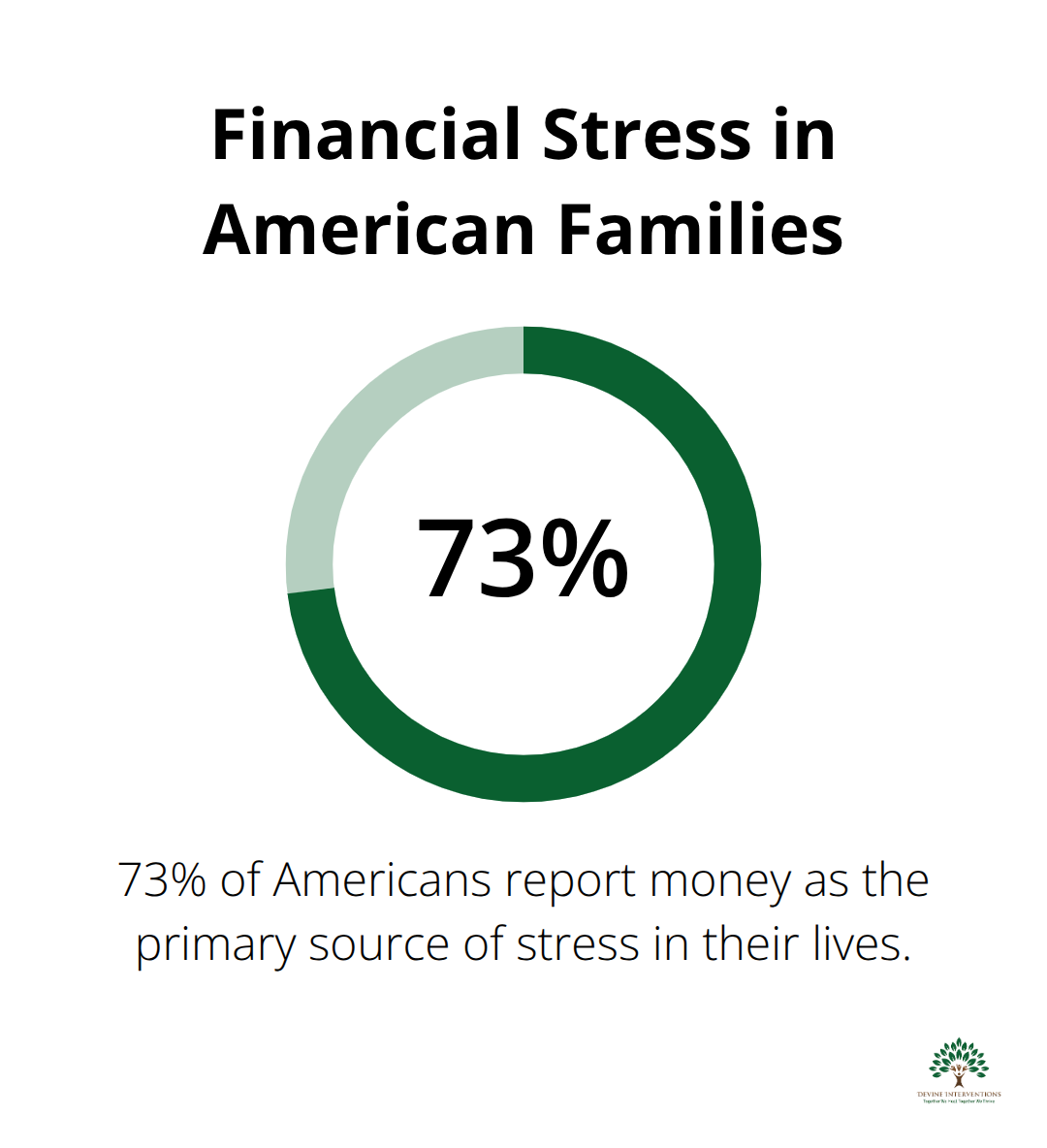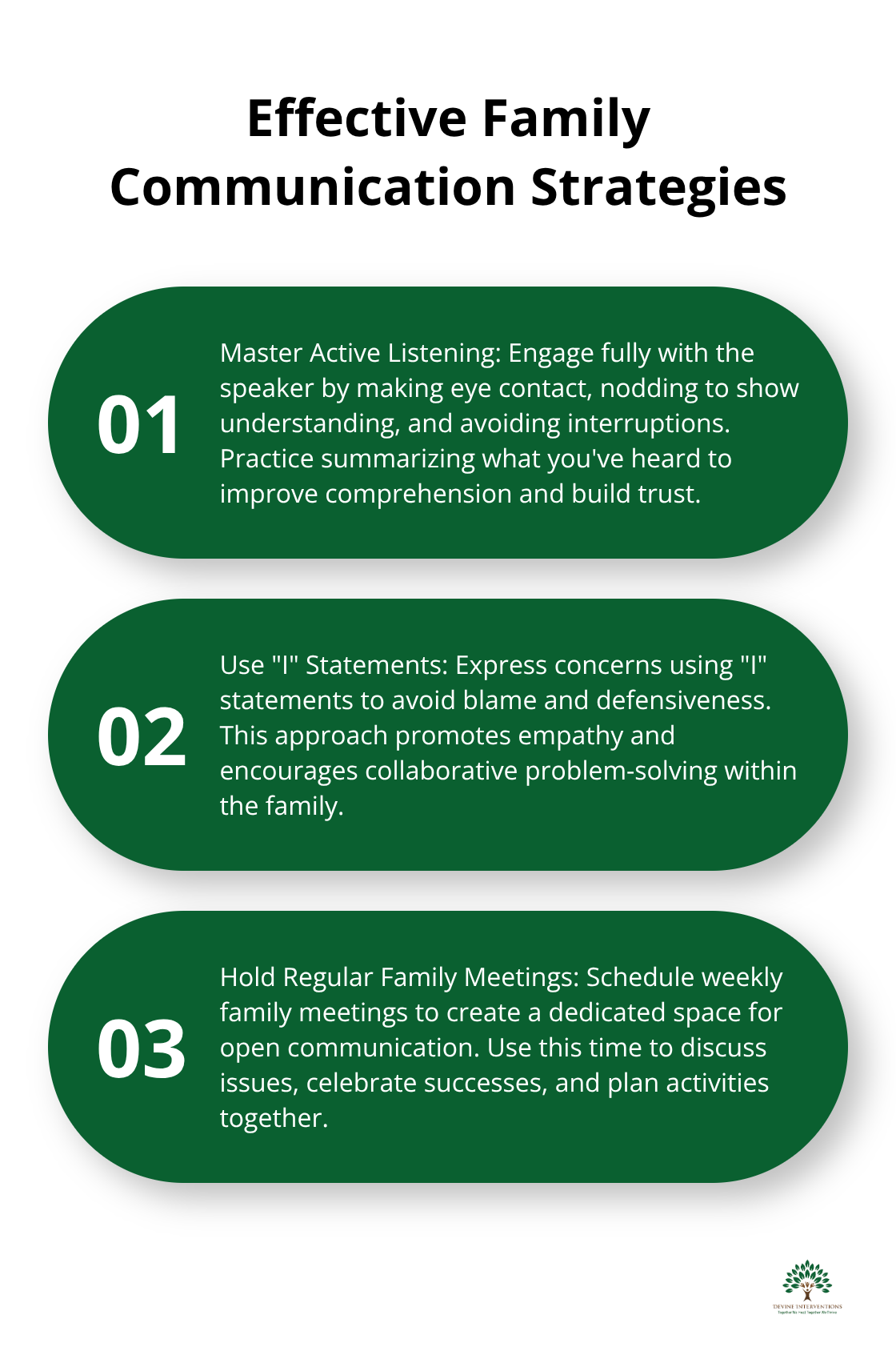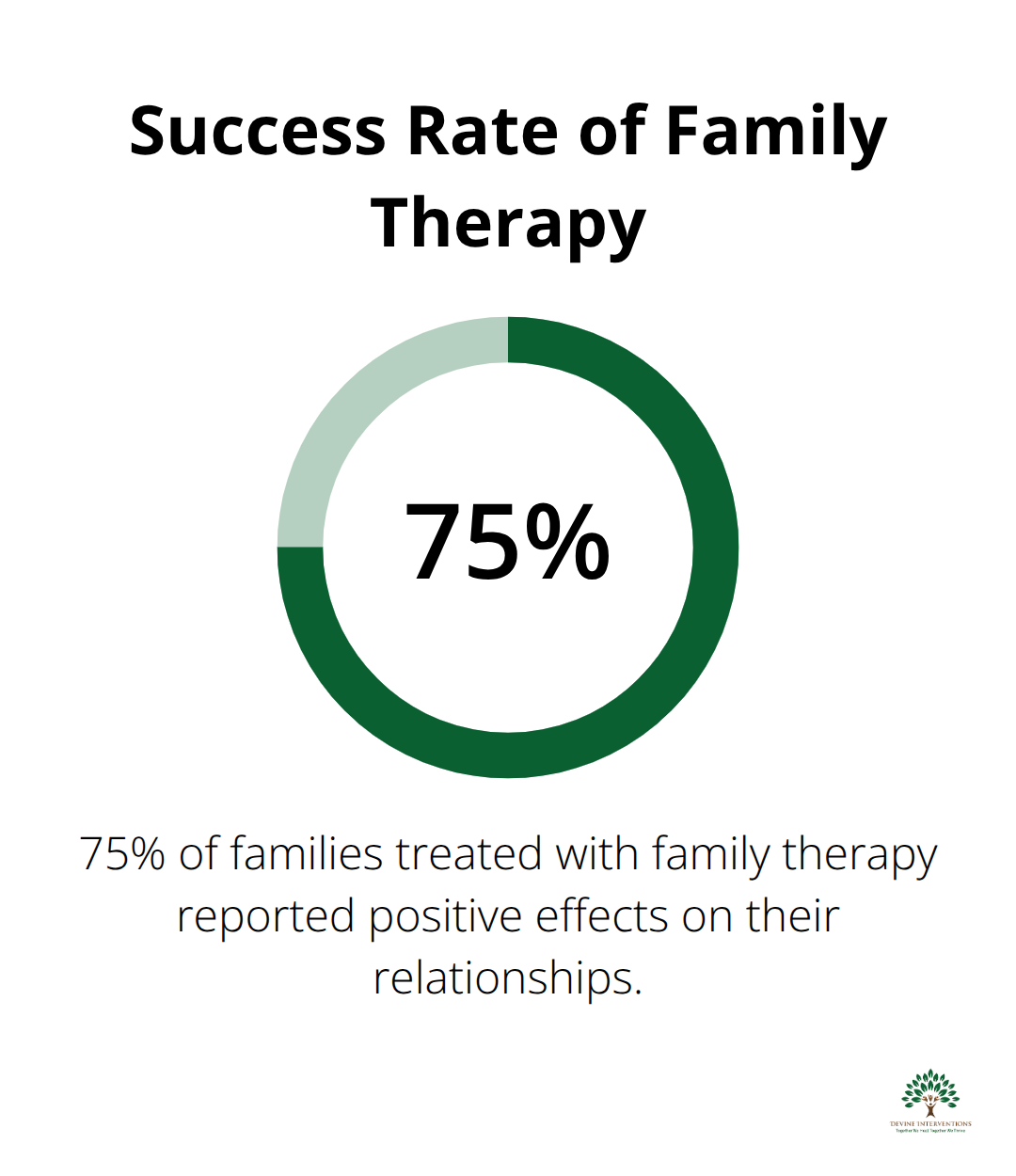Family problems can be overwhelming, affecting our mental health and overall well-being. At Devine Interventions, we understand the challenges you face and are here to help.
This blog post explores effective coping strategies for family problems, offering practical solutions to improve communication and manage stress. We’ll guide you through proven techniques to navigate family conflicts and build stronger relationships.
What Causes Family Problems?
Common Family Issues
Family problems stem from various sources, affecting relationships and well-being. Financial stress tops the list, with a 2025 study revealing that 73% of Americans cite money as the number-one cause of stress in life. Parenting disagreements and work-life balance struggles also contribute significantly to family tension.

Divorce and blended family dynamics add another layer of complexity. The U.S. Census Bureau reports that approximately 16% of children live in blended families, which can introduce unique challenges and adjustments for all family members.
Underlying Causes of Conflict
Unresolved childhood experiences often resurface in adult family conflicts. Dr. John Gottman’s research indicates that perpetual problems are centered on fundamental differences in personalities or lifestyle needs. These issues can persist and intensify without proper attention and resolution.
Poor communication skills exacerbate family problems. A survey by the National Healthy Marriage Resource Center found that 65% of divorced couples identified communication problems as the primary reason for their split. This statistic underscores the critical role of effective communication in maintaining healthy family relationships.
Mental Health Impact
The toll of family problems on mental health cannot be overstated. The National Alliance on Mental Illness reports that individuals in high-conflict families are three times more likely to develop depression. This increased risk highlights the profound impact that family dynamics can have on individual well-being.
Children are particularly vulnerable to the effects of ongoing family conflict. A study in the Journal of Child Psychology and Psychiatry found that 25% of children exposed to persistent family discord experience clinically significant anxiety symptoms. This finding emphasizes the importance of addressing family issues promptly to protect the mental health of all family members, especially children.
Breaking the Cycle
To address these challenges, families can try several strategies:
- Seek professional help (therapy or counseling can provide valuable tools and insights)
- Improve communication skills (active listening and expressing feelings constructively)
- Practice stress management techniques (meditation, exercise, or hobbies)
- Set clear boundaries and expectations within the family
Moving Towards Resolution
Understanding the root causes of family problems is the first step towards resolution. The next chapter will explore effective communication strategies that can help families navigate conflicts and build stronger, healthier relationships. These techniques will provide practical tools for addressing the issues we’ve discussed and fostering a more harmonious family environment.
How Can We Communicate Better?
Effective communication transforms family relationships. At Devine Interventions, we’ve witnessed how improved dialogue resolves conflicts. Here are practical strategies to enhance your family’s communication:

Master Active Listening
Active listening requires full engagement with the speaker. Make eye contact, nod to show understanding, and avoid interruptions.
Try this exercise: In your next family discussion, focus on listening without planning your response. After the speaker finishes, summarize what you heard. Family communication improves mental health, reduces stress, and builds trust.
Use “I” Statements
Express concerns with “I” statements to avoid blame and defensiveness. Instead of “You never help around the house,” say, “I feel overwhelmed when I manage all the household chores alone.”
This approach promotes empathy and encourages collaborative problem-solving.
Hold Regular Family Meetings
Schedule weekly family meetings to create a dedicated space for open communication. Use this time to discuss issues, celebrate successes, and plan activities.
Start with a 30-minute meeting each week. Set an agenda, allow everyone to contribute, and end with a positive activity. This structure provides a safe environment to address concerns before they escalate.
Establish Clear Boundaries
Healthy boundaries are essential for family harmony. Communicate effectively with your needs clearly and respect others’ limits.
Create a family contract that outlines shared values and individual responsibilities. Review and update this contract regularly to ensure it evolves with your family’s changing needs.
Seek Professional Support
If you struggle to improve family communication, consider professional help. Experienced therapists (like those at Devine Interventions) specialize in family dynamics and provide tailored guidance to enhance communication skills.
Effective communication improves with practice. Consistent application of these techniques creates a more harmonious family environment and strengthens relationships. In the next section, we’ll explore practical coping mechanisms to complement these communication strategies and further support your family’s well-being.
How Can We Manage Family Stress?
Family stress impacts everyone’s well-being. At Devine Interventions, we’ve observed how effective stress management techniques transform family dynamics. Here are practical strategies to help you and your loved ones cope with stress and build emotional resilience.
Practice Mindfulness as a Family
Mindfulness benefits both adults and children. Studies on mindfulness conducted among adolescents have shown promising results in overall well-being and mental health. Start a family mindfulness routine: Set aside 5 minutes daily for everyone to sit quietly and focus on their breath. (Use a mindfulness app to guide you through the process.)
For younger children, try “mindful eating.” Choose a small snack like a raisin or piece of fruit. Have everyone examine it closely, smell it, and eat it slowly, paying attention to every sensation. This simple exercise helps children develop awareness and reduce stress-related behaviors.
Create a Stress-Free Zone
Designate a specific area in your home as a “stress-free zone.” This can be a corner of the living room or a spare bedroom. Stock it with comfort items like soft blankets, stress balls, and calming music. Encourage family members to use this space when they need to decompress.
Make it a family project to design and set up this space together.
Seek Support Beyond the Family
Sometimes, the most effective support comes from outside the immediate family. Join a support group to gain valuable perspectives and coping strategies. The National Alliance on Mental Illness (NAMI) offers free support groups for families dealing with mental health challenges. These groups reduce feelings of isolation and increase problem-solving skills among participants.
For those dealing with specific issues like addiction or chronic illness in the family, organizations like Al-Anon or the Family Caregiver Alliance offer targeted support and resources.
Consider Professional Help
When family stress becomes overwhelming, professional help can be transformative. Specialized family therapy sessions address the unique dynamics of each family. This approach combines evidence-based practices with compassionate care to help families develop healthier communication patterns and coping strategies.
A study published in the “Journal of Marital and Family Therapy” found that family therapy had positive effects on 70-80% of families treated. (Don’t hesitate to reach out for professional support – it’s a sign of strength, not weakness.)

Implement Stress-Reduction Techniques
Try these stress-reduction techniques as a family:
- Deep breathing exercises
- Progressive muscle relaxation
- Regular physical activity (family walks or bike rides)
- Journaling or art therapy
- Limiting screen time and prioritizing face-to-face interactions
Consistent practice of these strategies helps create a more harmonious and resilient family environment.
Final Thoughts
Families face challenges, but effective coping strategies for family problems can transform relationships. Active listening, “I” statements, and regular family meetings improve communication and foster understanding. Stress management techniques like mindfulness and creating a dedicated relaxation space help build resilience and strengthen family bonds.
Professional support plays a vital role in family healing. At Devine Interventions, we offer tailored mental health services to address your family’s unique needs. Our team combines proven practices with compassionate care to help families develop healthier communication and coping strategies.
You have the power to create positive change in your family. Take the first step towards healing today. Reach out for support and watch as small improvements lead to significant transformations in your family dynamics. (Your family’s brighter future starts with a single action.)







